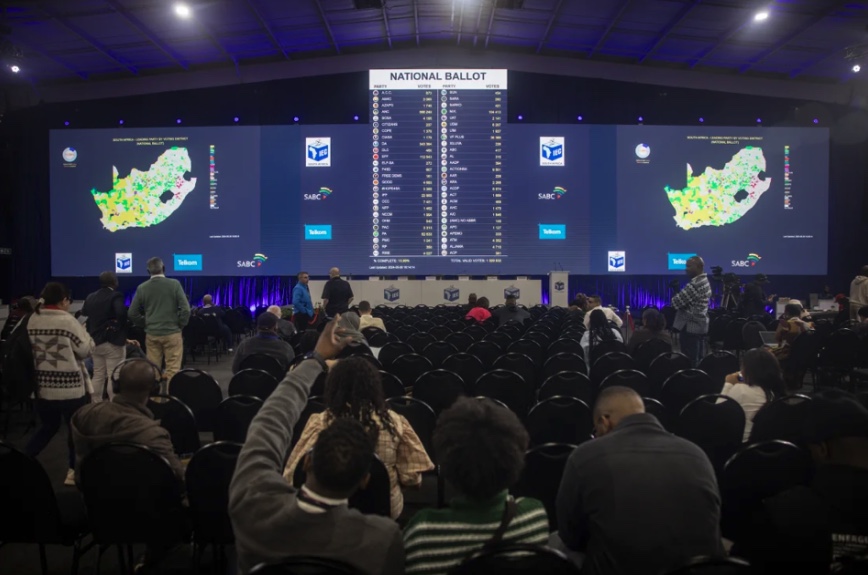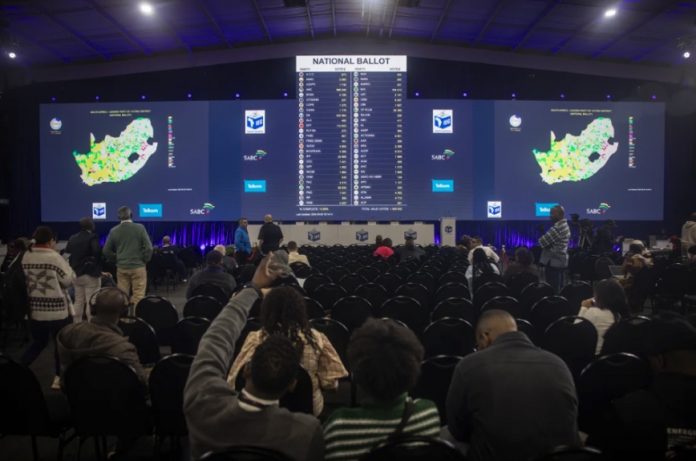ผลการเลือกตั้งในช่วงต้นของแอฟริกาใต้บ่งชี้ถึงการเปลี่ยนแปลงทางประวัติศาสตร์ที่อาจเกิดขึ้น โดยพรรคสภาแห่งชาติแอฟริกัน (ANC) ที่เป็นผู้ปกครองอาจสูญเสียเสียงข้างมากเป็นครั้งแรกในรอบ 30 ปี ภายใน 16.00 น. ตามเวลาท้องถิ่น มีรายงานหน่วยเลือกตั้ง 22% ซึ่งแสดงการสนับสนุน ANC ที่ 43.5% ฝ่ายค้านอย่างเป็นทางการ ได้แก่ กลุ่มพันธมิตรประชาธิปไตย (DA) ได้คะแนนเสียง 24.7% ในขณะที่กลุ่มนักสู้เพื่อเสรีภาพทางเศรษฐกิจ (EFF) จากฝ่ายซ้ายสุดได้คะแนน 8.9% ต่อคณะกรรมการการเลือกตั้ง กลุ่มวิจัย CSIR ที่น่าเชื่อถือคาดการณ์ว่า ANC จะได้รับคะแนนเสียงน้อยกว่า 45% ของคะแนนเสียงทั้งประเทศ เจ้าหน้าที่ทราบว่าการนับอย่างเป็นทางการอาจใช้เวลาหลายวัน โดยคาดว่าจะรายงานพื้นที่ชนบทซึ่งเป็นฐานที่มั่นของ ANC ในภายหลัง ซึ่งอาจส่งผลต่อผลลัพธ์ขั้นสุดท้าย
หาก ANC ไม่สามารถได้คะแนนเสียงเกิน 50% หลังจากกระบวนการนับคะแนน จะถูกบังคับให้จัดตั้งแนวร่วมกับพรรคการเมืองหนึ่งพรรคหรือมากกว่า ขึ้นอยู่กับขอบเขตของการสนับสนุนที่ลดลง อาจจำเป็นต้องเจรจากับฝ่ายค้านที่โดดเด่นเช่น DA หรือ EFF เพื่อรักษาอำนาจ พรรคแยกตัวจาก ANC อีกพรรคหนึ่งคือ พรรค uMkhonto weSizwe (MK) ซึ่งนำโดยอดีตประธานาธิบดี Jacob Zuma ดูเหมือนจะพร้อมสำหรับความสำเร็จใน KwaZulu-Natal จังหวัดชายฝั่งตะวันออกที่ล้อมรอบ Durban เมื่อเวลา 10.00 น. ตามเวลาท้องถิ่น ได้รับคะแนนเสียง 42.3% แซงหน้า ANC ที่ 20.1%
Zuma ผู้วิพากษ์วิจารณ์ผู้นำ ANC คนปัจจุบันและประธานาธิบดีซีริล รามาโฟซา ของแอฟริกาใต้ ลาออกจากตำแหน่งผู้นำในปี 2561 และรับโทษจำคุกช่วงสั้น ๆ ในปี 2564 ฐานดูหมิ่นศาล แม้ว่าศาลรัฐธรรมนูญจะตัดสิทธิ์จากการลงสมัครรับเลือกตั้งในรัฐสภาเมื่อสัปดาห์ที่แล้ว ซึ่งกำหนดให้เว้นวรรคไว้ 5 ปีภายหลังพ้นโทษ แต่ชื่อของเขาก็ยังคงอยู่ในบัตรลงคะแนน ตามกฎหมายการเลือกตั้งของแอฟริกาใต้ คณะกรรมการการเลือกตั้งมีเวลาเจ็ดวันในการประกาศผลขั้นสุดท้าย แม้ว่าโดยทั่วไปแล้วพวกเขาจะประกาศเร็วกว่านั้นก็ตาม ในปีนี้ คณะกรรมการได้กำหนดให้วันอาทิตย์ที่ 2 มิถุนายน เป็นวันประกาศผลขั้นสุดท้าย ในกรณีที่ ANC สูญเสียเสียงส่วนใหญ่ จะมีระยะเวลา 14 วันหลังจากการประกาศผลขั้นสุดท้ายในการจัดตั้งรัฐบาลใหม่ก่อนที่รัฐสภาชุดใหม่จะต้องประชุมกันเพื่อเลือกประธานาธิบดีของประเทศ
Initial results from South Africa’s election indicate a significant political transition, potentially the most substantial since apartheid.

Early results from South Africa’s election indicate a potential historic shift, with the ruling African National Congress (ANC) party possibly losing its majority for the first time in 30 years. By 4 p.m. local time, 22% of polling stations had reported, showing ANC support at 43.5%. The official opposition, the Democratic Alliance (DA), secured 24.7%, while the far-left Economic Freedom Fighters (EFF) obtained 8.9%, per the electoral commission. Respected research group CSIR projected the ANC winning less than 45% of the national vote. Officials note the official tally may take days, with rural areas—ANC strongholds—expected to report later, potentially influencing final results.
If the ANC fails to secure over 50% of the votes after the counting process, it will be compelled to form a coalition with one or more parties. Depending on the extent of its decreased support, it might be required to negotiate with prominent opposition parties like the DA or EFF to retain power. Another breakaway party from the ANC, the uMkhonto weSizwe Party (MK), led by former President Jacob Zuma, seems poised for success in KwaZulu-Natal, the eastern coastal province encompassing Durban. As of 10 a.m. local time, it had secured 42.3% of the votes there, surpassing the ANC’s 20.1%.
Zuma, a vocal critic of current ANC leader and South African President Cyril Ramaphosa, resigned as leader in 2018 and served a brief jail term in 2021 for contempt of court. Despite being disqualified from running for parliament last week by the Constitutional Court, which mandated a five-year gap after the completion of his sentence, his name remained on the ballot. According to South Africa’s electoral laws, the electoral commission has a seven-day window to declare the final results, although they typically announce them sooner. This year, the commission has designated Sunday, June 2, as the final results day. In the event of the ANC losing its majority, it will have a 14-day period following the declaration of final results to establish a new government before a new parliament must convene to elect the nation’s president.
By CNN NEWS

















